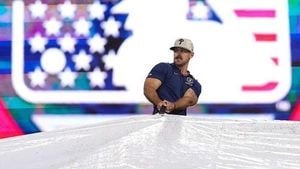Scotland’s hopes for a first World Cup appearance in 28 years took a harsh hit on June 6, 2025, as they suffered a sobering 3-1 defeat to Iceland in a friendly match at Hampden Park. The result, marked by early injuries, defensive errors, and a debutant goalkeeper’s nightmare, has left fans and players alike questioning the team’s readiness for the challenges ahead.
The night began disastrously for Scotland when goalkeeper Angus Gunn was forced off the pitch after just six minutes due to an ankle injury sustained during a collision with Iceland’s Andri Gudjohnsen. Gunn’s premature exit triggered a goalkeeping crisis, as the only other options were either injured or unavailable. Into the breach stepped 22-year-old debutant Cieran Slicker, an Ipswich Town goalkeeper who had played only nine minutes of football all season and had never appeared in a league game. The pressure was immense, and it showed almost immediately.
Within 64 seconds of entering the game, Slicker’s poor clearance was intercepted by Stefán Teitur Thórdarson, who nodded the ball to Andri Gudjohnsen. The young striker wasted no time, rifling a left-footed shot into the top right corner of the net, giving Iceland an early and shocking lead. Gudjohnsen’s goal echoed a family legacy, as his father Eidur Gudjohnsen had also scored at Hampden in 2003, underlining the historic nature of the night.
Scotland responded with some fight, and Max Johnston’s corner found John Souttar, who powered a stooping header to level the score and briefly lift the spirits of the home crowd. However, the reprieve was short-lived. A scramble from an Iceland corner led to a calamitous own goal by Lewis Ferguson just before halftime. The ball ricocheted off Ferguson and past Slicker, who had dived over it, leaving the Scotland defense looking disorganized and vulnerable. The half-time whistle was met with boos from the half-filled stadium, reflecting the fans’ frustration and disappointment.
The second half brought no relief. Seven minutes after the restart, Victor Palsson met an Albert Gudmundsson free-kick with a powerful header that slipped through Slicker’s hands, extending Iceland’s lead to 3-1. A lengthy VAR check confirmed the goal, much to the dismay of the Scottish supporters. Scotland’s attempts to claw back were further thwarted when George Hirst’s tap-in was ruled out for offside in the build-up involving Scott McTominay, extinguishing one of the few genuine chances Scotland created.
Manager Steve Clarke admitted the night was a tough one, particularly for the inexperienced Slicker. “Cieran wasn’t ready for his Scotland debut,” Clarke confessed, highlighting the unexpected goalkeeper crisis after Angus Gunn’s injury and the absence of other senior keepers. Clarke revealed he was scrambling to find another goalkeeper ahead of Scotland’s next match against Liechtenstein on June 9, 2025, acknowledging the challenge of preparing a squad under such circumstances.
Scotland captain Andy Robertson was equally candid about the team’s poor showing. “We all know that’s nowhere near good enough,” Robertson said. “Getting beat 3-1 at home by a team that, no disrespect, we should beat... but they’ve been better than us. We need to get it right pretty quickly.” His sentiments were echoed by midfielder Lewis Ferguson, who lamented, “We conceded sloppy goals from set pieces and that’s just not good enough.” Defender John Souttar stressed the need to bounce back quickly, saying, “We need to go and win the game [against Liechtenstein], put on a performance and get a bit of momentum back going into the September internationals.”
Iceland’s victory was a statement of intent from a side ranked 30 places below Scotland in the FIFA rankings. Their three goals matched the total they had scored in all six previous encounters combined, signaling a significant shift in the dynamic between the two teams. Iceland’s coach Arnar Gunnlaugsson revealed his team’s strategy to target the inexperienced Slicker, explaining, “It was the instruction to press him right away. He was cold, especially with his feet, and it was an opportunity to give it a goal.” Gunnlaugsson also expressed surprise at Scotland’s tactical setup, noting a shift from their usual formation and how his team adapted their pressing to exploit it.
Statistically, the match highlighted Scotland’s ongoing struggles. Since September 12, 2023, Scotland has lost 12 of their last 21 matches across all competitions, a run comparable to that of minnows San Marino. The defensive frailties were stark, with set-piece defending proving particularly costly. The goalkeeper position, a long-standing issue for Scotland, was exposed once again. Neither Angus Gunn nor Cieran Slicker are considered international class, and with veteran Craig Gordon sidelined due to injury, the team’s options are limited.
Individual milestones were overshadowed by the result. Kieran Tierney earned his 50th cap for Scotland at 28 years and one day old, becoming the seventh youngest player to reach that mark. Meanwhile, Slicker became the youngest Scotland goalkeeper to debut since Craig Gordon in 2005, albeit in unfortunate circumstances.
The match also underlined the challenges facing manager Steve Clarke, who has won only two of his 12 friendlies in charge, against Luxembourg and Gibraltar. The team’s lack of cohesion and confidence was evident throughout the game, raising questions about Scotland’s prospects in the upcoming World Cup qualifying campaign.
George Hirst, handed a rare chance to lead the line, showed promise despite the disallowed goal and some missed opportunities. His involvement provided a glimpse of potential, but it was not enough to turn the tide against a well-organized and opportunistic Iceland side.
As the Tartan Army left Hampden Park, many voices echoed the need for reflection and improvement. The boos at full-time were a stark reminder that expectations remain high, even in friendly fixtures. Scotland’s next match against Liechtenstein offers a chance to regroup and regain confidence, but the road to the World Cup looks steeper than ever.
In the aftermath, the focus will be on shoring up defensive weaknesses, securing a reliable goalkeeper, and restoring the team’s attacking threat. With the World Cup qualifiers looming, Scotland must address these issues swiftly if they are to break their 28-year absence from football’s biggest stage.
For now, the defeat to Iceland serves as a sobering wake-up call. The journey to Qatar 2026 is just beginning, but Scotland’s preparations have started on a shaky note, leaving fans and pundits alike wondering if the team can rise to the challenge ahead.





